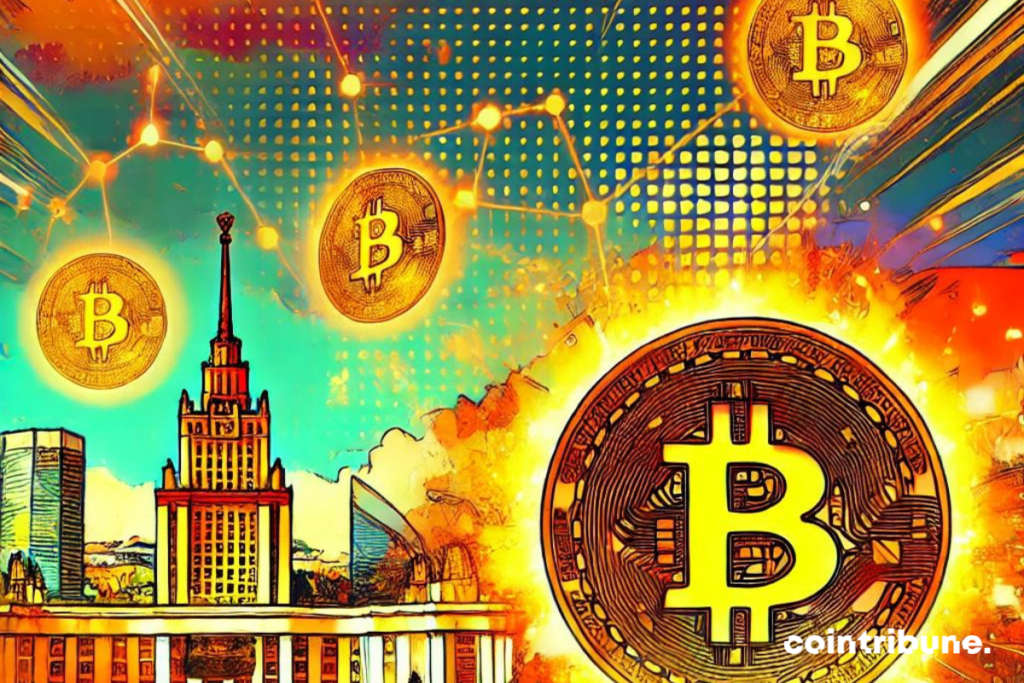Bitcoin Finally Legal in Russia for International Trade
The adoption of bitcoin as an international payment method by Russia marks a historical turning point. Facing Western sanctions and increasing economic pressure, Russia turns to bitcoin and other cryptos to circumvent financial hurdles. This decision, approved by the State Duma, offers a new perspective for Russian businesses looking to navigate through a severely restrictive economic context.

Bitcoin: A Response to Sanctions
Russia, faced with an avalanche of international sanctions in response to its invasion of Ukraine, seeks solutions to maintain its economic exchanges.
Last June, the Russian Parliament adopted in the first reading a law aimed at legalizing international payments in bitcoin.
The final vote, which took place on July 30, confirmed the entry into force of this legislation from September 1, 2024.
This decision is crucial for Russia, disconnected from the SWIFT network for two years, significantly limiting its international transaction capabilities.
The highly anticipated new legislation will bypass this exclusion, providing a lifeline for Russian companies affected by the sanctions.
Bitcoin, now recognized as a foreign currency, becomes a strategic alternative for international payments.
The introduction of this legislation also formalizes the use of cryptocurrencies under a clear legal framework, regulated by the Bank of Russia.
This legal framework aims to prevent financial risks and ensure the secure use of cryptos in international transactions.
The goal is twofold: to facilitate payments for businesses and to mitigate the impact of sanctions on the Russian economy.
A Change of Direction for the Bank of Russia
The Bank of Russia, once reluctant towards cryptocurrencies, now adopts a more favorable stance.
In January 2022, the institution had proposed banning crypto transactions, deeming them a threat to financial stability and monetary sovereignty.
Today, facing the necessity to maintain capital flow, the central bank is considering using bitcoin for cross-border payments.
This new direction marks a significant reversal in Russian monetary policy.
Elvira Nabiullina, the Governor of the Bank of Russia, indicated that experimental crypto payments could be conducted before the end of 2024.
This openness to cryptos reflects a pragmatic adaptation to current economic realities, where sanctions limit access to traditional foreign currencies.
The Digital Ruble
In parallel with the integration of cryptocurrencies, Russia is also exploring the development of a digital version of its national currency, the ruble.
This project, distinct from bitcoin and other cryptos, aims to create a digital currency controlled by the state.
Unlike decentralized cryptocurrencies, the digital ruble would be issued by the Bank of Russia, ensuring strict supervision and regulation.
The digital ruble could offer significant advantages, particularly in terms of traceability and transaction security.
However, it also raises questions about privacy protection and state control. The shift towards a digital economy is accelerating, and Russia seems determined not to lag in this global race for financial innovation.
The legalization of bitcoin and cryptocurrencies for international payments in Russia represents a major evolution in the country’s economic strategy.
In response to economic sanctions and cross-border payment challenges, Russia turns to digital solutions to support its businesses.
Regulation by the Bank of Russia ensures a secure framework for these transactions, opening the way to new economic opportunities. As the country also explores the potential of a digital ruble, Russia is firmly positioning itself towards the digital future, adapting its policies to contemporary challenges and exploring the frontiers of the digital economy.
Maximize your Cointribune experience with our "Read to Earn" program! For every article you read, earn points and access exclusive rewards. Sign up now and start earning benefits.

Fascinated by Bitcoin since 2017, Evariste has continuously researched the subject. While his initial interest was in trading, he now actively seeks to understand all advances centered on cryptocurrencies. As an editor, he strives to consistently deliver high-quality work that reflects the state of the sector as a whole.
The views, thoughts, and opinions expressed in this article belong solely to the author, and should not be taken as investment advice. Do your own research before taking any investment decisions.